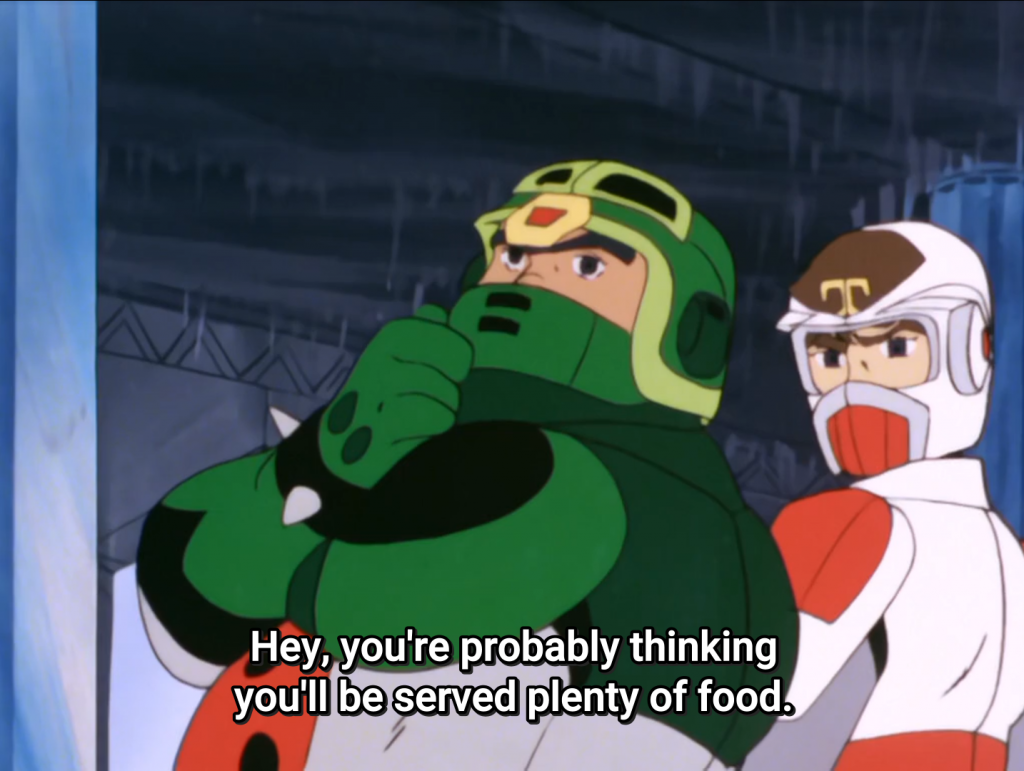Beautiful Eternal Snow

Bellamis, now Chief Captain, leads the Lassetz Corps battleship to attack the Cosmos. Kugo lures Bellamis out of the way, and the Cosmos uses the opportunity to escape to an ice planet. Fromeda, the queen of the ice planet, is a living copy of Jogo’s late sister. Jogo, who trusts her completely, summons the Cosmos at her recommendation. Fromeda, a snow spirit who wishes to become a human being, is determined to obtain the Galaxy Energy by any means necessary. Jogo learns of this and tries to persuade her to reconsider her decision.
You can download the torrent file from Anidex or Anirena, or get direct links from AnimeTosho.
Translation Thoughts
When Bellamis refers to the Princess Aurora, Bellamis always says お姫様 ohime-sama in a really sarcastic way. The expression お姫様 ohime-sama is extremely formal, like saying “Your Royal Highness”. Bellamis is just being sarcastic.
I think the translation works pretty well the first time Bellamis say it. At 5:58:
どこまで甘いお姫様だ
Dokomade amai ohime-sama da
How sweet a princess you are!
It’s obvious that for Bellamis, Aurora must be a spoiled little girl. Bellamis has never met her up to this point.
The sarcasm is probably lost in translation the second time:
いかがですかお姫様
Ikaga desu ka, ohime-sama?
How about that, princess?
I thought if I translated that to “How about that, your highness?” that would transmit to the viewer the sarcasm a little better, but then people would hear the word 姫 hime without reading the word “princess” anywhere in the subtitles and would write me that the line was a bad translation 😏.
Jogo says a common Japanese expression at 18:51 that I thought I explained before in Episode 18 (Kugo says it at 16:49 in Episode 18), but it seems I didn’t.
He says:
よし, 一か八かだ
Yoshi, ichikabachika da
Alright, one or eight
This expression 一か八か ichikabachika comes from gambling while playing a Japanese card game called かるた karuta which literally means “carta” in Portuguese (and in Spanish too!), or “card” in English. The expression means something like “do or die”, “sink or swim”, things like that. I typically translate it as “Here goes nothing” or “All or nothing”, depending on the context.
What’s funny for me personally about this expression is that around 20 years ago, a Japanese J-Pop band called Do as Infinity released an album named True Song, and one of the songs from the album is One or Eight. Just like that, in English. I guess these guys thought it would be cool to translate the title to English and probably thought it would mean the same. But “one or eight” in English doesn’t mean a thing!
Every time I hear this expression, I remember that Do as Infinity song and laugh a little bit.
Happy New Year!
Hola!
Qué emotivo y buen capítulo, snif!
La gente debe comprender que toca adaptar mucho y tú has hecho un excelente trabajo, así que tranquilo.
Ah, también podría ser; “It’s now or never”?
Feliz Año Nuevo! 😀
¡Feliz Año!
Sí, también sirve “It’s now or never”, pero imagínate poner “Uno y ocho” así en español en tus episodios 😂
En el Episodio 18 definitivamente quedaba mejor “Es ahora o nunca” (creo que puse “It’s all or nothing” pero es equivalente), pero en este episodio es algo como un “¡Que sea lo que Dios quiera!”, pero sin el tema religioso jejejeje. Espero se te ocurra algo bueno cuando llegues a este episodio.
Happy New Year to you and thank you again for all that you have given us in 2022. We still have a long way to go to finish this series, but each episode you give us brings us closer to the end. I can’t wait for the day when you can shout “Yatta!”
Thank you so much!
MUCHAS GRACIAS POR ESTE EXCELENTE EPISODIO
thanks to you I’ve just learned a second Portuguese word the Japanese use. The first one, of course, is “pan” (pão.) That and you explaining why you chose to go with just “princess” or what “one or eight” really means are the reasons why I keep insisting that you include these notes as a txt file in all your torrents. None of them are essential to understand the episode, but they are extremely cool for those of us studying Japanese or are just interested in seeing how much deeper the script is in Japanese.
By the way, I’d keep the kuns, chans, sans, samas, donos etc. I think the West realized those exist and what they mean ever since people watched Karate-Kid. Well, at least the “san.” Then again, I don’t really see Mr. Miyagi using “san” when talking Daniel, but I digress. My point is, probably 99.9% of your target audience prefers to watch stuff with the original audio and are not afraid of subtitles. Those people like watching animes and, because of that, after watching one or two, probably got curious and looked what all those honorifics mean. It is something they will hear all the time and it is very easy to remember what they mean. And once they grasp that they will be able to grasp little nuances like when someone is being very respectful, talking to someone of a lower rank, etc.
Not that any of that really matters to me. “Hime” is part of my extensive 10 words or so vocabulary so, even if you do your adaptation, I can still tell what exactly was said by Bellamis 🙂
In fact, I’m so good that I even know what “amai”, in that context, means. All thanks to Vegeta throwing it at Goku all the time 🙂
Enough about that. Let’s talk about the episode.
OMG! That is a fire missile! Not even the Queen Cosmos can survive being hit by fire. In space…